Punjab State Board PSEB 6th Class Punjabi Book Solutions Punjabi Grammar Vacana ਵਚਨ Exercise Questions and Answers.
PSEB 6th Class Punjabi Grammar ਵਚਨ
ਪ੍ਰਸ਼ਨ 1.
‘ਵਚਨ ਕਿਸ ਨੂੰ ਆਖਦੇ ਹਨ ?
ਜਾਂ
ਵਚਨ ਕਿਸ ਨੂੰ ਆਖਦੇ ਹਨ ? ਪੰਜਾਬੀ ਵਿਚ ਵਚਨ ਕਿਹੜੇ-ਕਿਹੜੇ ਹਨ ? ਉਦਾਹਰਨਾਂ ਸਹਿਤ ਦੱਸੋ !
ਉੱਤਰ :
ਇਕ ਜਾਂ ਇਕ ਤੋਂ ਬਹੁਤੀਆਂ ਚੀਜ਼ਾਂ, ਵਿਸ਼ੇਸ਼ਤਾਵਾਂ ਜਾਂ ਕਿਰਿਆਵਾਂ ਦੇ ਭੇਦ ਨੂੰ ਪ੍ਰਗਟ ਕਰਨ ਵਾਲਾ ਸ਼ਬਦ ਦਾ ਰੂਪ ਉਸ ਦਾ ਵਚਨ ਹੁੰਦਾ ਹੈ ।
![]()
ਪ੍ਰਸ਼ਨ 2.
ਪੰਜਾਬੀ ਵਿਚ ਵਚਨ ਕਿਹੜੇ-ਕਿਹੜੇ ਹਨ ? ਉਦਾਹਰਨਾਂ ਸਹਿਤ ਦੱਸੋ ।
ਉੱਤਰ :
ਪੰਜਾਬੀ ਵਿਚ ਵਚਨ ਦੋ ਪ੍ਰਕਾਰ ਦੇ ਹੁੰਦੇ ਹਨ, ਇਕ-ਵਚਨ ਤੇ ਬਹੁ-ਵਚਨ ।
ਇਕ-ਵਚਨ :
ਸ਼ਬਦਾਂ ਦਾ ਜਿਹੜਾ ਰੂਪ ਕਿਸੇ ਇਕ ਚੀਜ਼, ਗੁਣ ਜਾਂ ਕਿਰਿਆ ਲਈ ਵਰਤਿਆ ਜਾਵੇ, ਉਹ ਇਕ-ਵਚਨ ਰੂਪ ਵਿਚ ਹੁੰਦਾ ਹੈ । ਪੰਜਾਬੀ ਵਿਚ ਇਸ ਦੇ ਦੋ ਰੂਪ ਹੁੰਦੇ ਹਨ-ਸਧਾਰਨ ਤੇ ਸੰਬੰਧਕੀ । ਇਸ ਦੇ ਦੋਵੇਂ ਰੂਪ ਹੇਠ ਲਿਖੇ ਵਾਕਾਂ ਤੋਂ ਸਪੱਸ਼ਟ ਹਨ-
(ਉ) ਤੇਰਾ ਮੁੰਡਾ ਕਿੱਥੇ ਹੈ ? (“ਮੁੰਡੇ’ ਇਕ-ਵਚਨ, ਸਧਾਰਨ ਰੂਪ) ।
(ਅ) ਤੇਰੇ ਮੁੰਡੇ ਨੇ ਸਾਰਾ ਕੰਮ ਵਿਗਾੜ ਦਿੱਤਾ । (‘ਮੁੰਡੇ’ ਇਕ-ਵਚਨ ਸੰਬੰਧਕੀ ਰੂਪ ।
(ਈ) ਬਹੁ-ਵਚਨ-ਸ਼ਬਦਾਂ ਦਾ ਜਿਹੜਾ ਰੂਪ ਇਕ ਤੋਂ ਬਹੁਤੀਆਂ ਚੀਜ਼ਾਂ, ਗੁਣਾਂ ਜਾਂ ਕਿਰਿਆਵਾਂ ਲਈ ਵਰਤਿਆ ਜਾਵੇ, ਬਹੁ-ਵਚਨ ਰੂਪ ਵਿਚ ਹੁੰਦਾ ਹੈ । ਪੰਜਾਬੀ ਵਿਚ ਇਸ ਦੇ ਵੀ ਦੋ ਰੂਪ ਹੁੰਦੇ ਹਨ : ਸਧਾਰਨ ਤੇ ਸੰਬੰਧਕੀ । ਇਹ ਦੋਵੇਂ ਰੂਪ ਹੇਠ ਲਿਖੇ ਵਾਕਾਂ ਤੋਂ ਸਪੱਸ਼ਟ ਹਨ-
(ੳ) ਉਸ ਦੇ ਦੋ ਮੁੰਡੇ ਹਨ । (‘ਮੁੰਡੇ ਬਹੁ-ਵਚਨ, ਸਧਾਰਨ ਰੂਪ) ।
(ਅ) ਉਸ ਦੇ ਮੁੰਡਿਆਂ ਨੇ ਸਾਰਾ ਕੰਮ ਵਿਗਾੜ ਦਿੱਤਾ । (“ਮੁੰਡਿਆਂ ਬਹੁ-ਵਚਨ, ਸੰਬੰਧਕੀ ਰੂਪ)
ਉਪਰੋਕਤ ਵਾਕਾਂ ਤੋਂ ਸਪੱਸ਼ਟ ਹੁੰਦਾ ਹੈ ਕਿ ਪੰਜਾਬੀ ਵਿਚ ਇਕ-ਵਚਨ ਤੇ ਬਹੁ-ਵਚਨ ਦੇ ਦੋਦੋ ਰੂਪ ਹੁੰਦੇ ਹਨ । ਦੋਹਾਂ ਦਾ ਇਕ ਸਧਾਰਨ ਰੂਪ ਹੁੰਦਾ ਹੈ ਤੇ ਦੂਜਾ ਸੰਬੰਧਕੀ । ਜਦੋਂ ਇਨ੍ਹਾਂ ਨਾਲ ਸੰਬੰਧਕ ਦਾ, ਦੇ, ਦੀਆਂ, ਨੇ, ਲਈ, “ਖ਼ਾਤਰ’, ਤੋਂ ਆਦਿ ਦੀ ਵਰਤੋਂ ਹੁੰਦੀ ਹੈ, ਤਾਂ ਉਹ ਸੰਬੰਧਕੀ ਰੂਪ ਕਹਾਉਂਦਾ ਹੈ ।
(ਨੋਟ-ਅਧਿਆਪਕਾਂ ਤੇ ਵਿਦਿਆਰਥੀਆਂ ਨੂੰ ਇਕ-ਵਚਨ ਤੇ ਬਹੁ-ਵਚਨ ਦੇ ਇਹੋ ਤਰੀਕੇ ਹੀ ਸਿਖਾਉਣੇ ਤੇ ਸਿੱਖਣੇ ਚਾਹੀਦੇ ਹਨ | ਪੰਜਾਬੀ ਵਿਚ ਇਕ-ਵਚਨ ਤੇ ਬਹੁ-ਵਚਨ ਦੇ ਦੋ-ਦੋ ਰੂਪ ਹੀ ਲਿਖਣੇ ਚਾਹੀਦੇ ਹਨ ।
ਹੇਠਾਂ ਦੇਖੋ ਵਚਨ ਬਦਲੀ ਦੇ ਕੁੱਝ ਨਿਯਮ-
(ਉ) ਜਿਨ੍ਹਾਂ ਪੁਲਿੰਗ ਸ਼ਬਦਾਂ ਦੇ ਅੰਤ ਵਿਚ ਕੰਨਾ ਲੱਗਾ ਹੁੰਦਾ ਹੈ, ਉਨ੍ਹਾਂ ਦੇ ਇਕ-ਵਚਨ ਤੇ ਬਹੁ-ਵਚਨ ਇਸ ਪ੍ਰਕਾਰ ਹੁੰਦੇ ਹਨ-
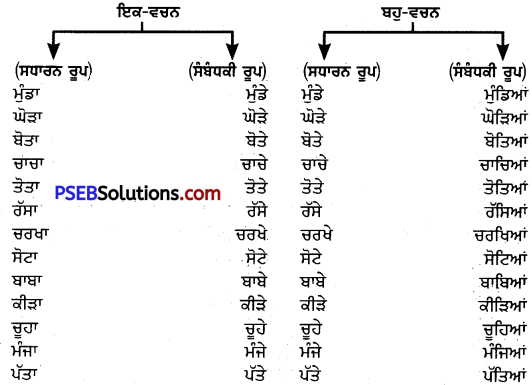
ਕੁੱਝ ਕੰਨਾ ਅੰਤਕ ਪੁਲਿੰਗ ਸ਼ਬਦਾਂ ਦਾ ਇਕ-ਵਚਨ ਤੇ ਸਧਾਰਨ ਬਹੁ-ਵਚਨ ਰੂਪ ਇੱਕੋ ਹੀ ਹੁੰਦਾ ਹੈ-
ਇਕ-ਵਚਨ – ਬਹੁ-ਵਚਨ
ਇਕ ‘ਦਰਿਆ’ – ਦੇ ‘ਦਰਿਆ’
ਇਕ ‘ਭਰਾ’ – ਚਾਰ “ਭਰਾ”
ਪਰ ਇਹ ਇਨ੍ਹਾਂ ਦੇ ਸਧਾਰਨ ਬਹੁ-ਵਚਨ ਰੂਪ ਹਨ, ਇਨ੍ਹਾਂ ਦੇ ਸੰਬੰਧਕੀ ਬਹੁ-ਵਚਨ ਰੂਪ ਹਨ : ਦਰਿਆਵਾਂ, ਭਰਾਵਾਂ ।
![]()
(ਅ) ਜਿਨ੍ਹਾਂ ਪੁਲਿੰਗ ਸ਼ਬਦਾਂ ਦੇ ਅੰਤ ਵਿਚ ਕੰਨਾ ਨਹੀਂ ਲੱਗਾ ਹੁੰਦਾ, ਸਗੋਂ ਮੁਕਤਾ, ਬਿਹਾਰੀ, ਔਕੜ, ਦੁਲੈਂਕੜ ਆਦਿ ਲੱਗੇ ਹੁੰਦੇ ਹਨ, ਉਨ੍ਹਾਂ ਦੇ ਇਕ-ਵਚਨ ਰੂਪ ਅੱਗੇ ਲਿਖੇ ਅਨੁਸਾਰ ਬਣਦੇ ਹਨ
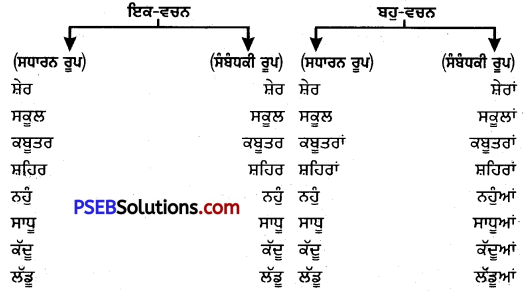
(ਇ) ਜਿਨ੍ਹਾਂ ਇਸਤਰੀ ਲਿੰਗ ਸ਼ਬਦਾਂ ਦੇ ਅੰਤ ਵਿਚ ਮੁਕਤਾ, ਕੰਨਾ, ਬਿਹਾਰੀ, ਔਕੜ, ਦੁਲੈਂਕੜ, ਦੁਲਾਵਾਂ, ਹੋੜਾ ਜਾਂ ਕਨੌੜਾ ਲੱਗਾ ਹੁੰਦਾ ਹੈ, ਉਨ੍ਹਾਂ ਦੇ ਇਕ-ਵਚਨ ਤੇ ਬਹੁ-ਵਚਨ ਦੇ ਰੂਪ ਹੇਠ ਲਿਖੇ ਅਨੁਸਾਰ ਬਣਦੇ ਹਨ-
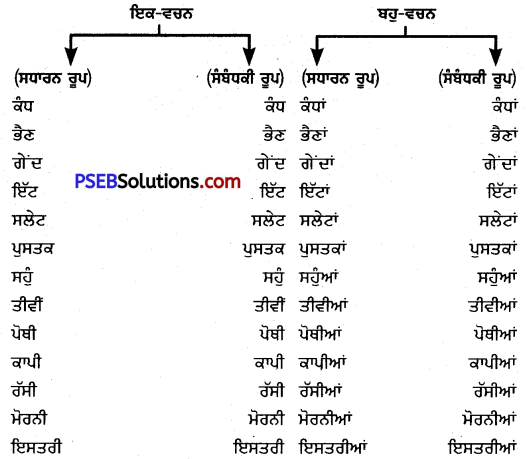
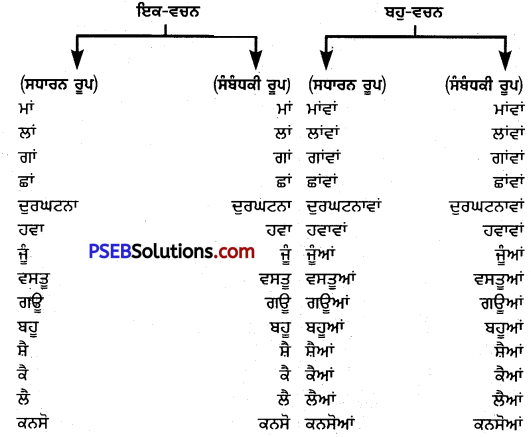
ਪ੍ਰਸ਼ਨ 3.
ਹੇਠ ਲਿਖਿਆਂ ਦੇ ਵਚਨ ਬਦਲੋ-.
ਘੋੜਾ, ਮੇਜ਼, ਧੀ, ਛਾਂ, ਵਸਤੂ, ਕਵਿਤਾ, ਲੇਖ, ਹਵਾ, ਬੋਰੀ, ਕਿਰਿਆ, ਘਰ, ਤੂੰ, ਤੇਰਾ, ਮੈਂ, ਉਹ ।
ਉੱਤਰ :
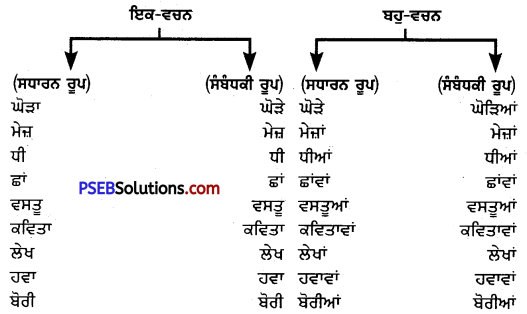
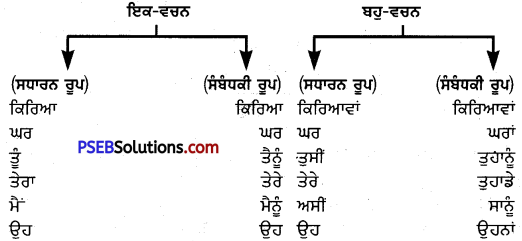
![]()
ਪ੍ਰਸ਼ਨ 4.
ਹੇਠ ਲਿਖੇ ਵਾਕਾਂ ਵਿਚਲੇ ਨਾਂਵ ਸ਼ਬਦਾਂ ਦੇ ਵਚਨ ਬਦਲ ਕੇ ਵਾਕ ਨੂੰ ਦੁਬਾਰਾ ਲਿਖੋ-
(ਉ) ਲੜਕਾ ਗੀਤ ਗਾ ਰਿਹਾ ਹੈ ।
(ਆ) ਪੰਛੀ ਅਕਾਸ਼ ਵਿਚ ਉਡਾਰੀ ਮਾਰ ਰਿਹਾ ਹੈ ।
(ਈ) ਚਿੜੀ ਚੀਂ-ਚੀਂ ਕਰਦੀ ਹੈ ।
(ਸ) ਪੁਸਤਕ ਅਲਮਾਰੀ ਵਿਚ ਪਈ ਹੈ ।
(ਹ) ਕੁੜੀ ਰੌਲਾ ਪਾ ਰਹੀ ਹੈ ।
(ਕ) ਸ਼ੇਰਨੀ ਜੰਗਲ ਵਿਚ ਫਿਰਦੀ ਹੈ ।
(ਖ) ਅੰਬ ਮਿੱਠਾ ਤੇ ਸੁਆਦੀ ਹੈ ।
(ਗ) ਕਿਸਾਨ ਹਲ ਚਲਾ ਰਿਹਾ ਹੈ ।
(ਘ) ਮੇਰੇ ਮਿੱਤਰ ਕੋਲ ਬੱਕਰੀ ਹੈ ।
(ਝ) ਕੁੜੀ ਟੈਲੀਫੋਨ ‘ਤੇ ਗੱਲ ਕਰ ਰਹੀ ਹੈ ।
(ਚ) ਚਿੱਟਾ ਘੋੜਾ ਦੌੜਦਾ ਹੈ ।
(ਛ) ਉੱਚੀ ਇਮਾਰਤ ਦੂਰੋਂ ਦਿਸਦੀ ਹੈ ।
(ਜ) ਮੁੰਡਾ ਕਾਪੀ ਉੱਤੇ ਲਿਖਦਾ ਹੈ ।
ਉੱਤਰ :
(ੳ) ਲੜਕੇ ਗੀਤ ਗਾ ਰਹੇ ਹਨ ।
(ਆ) ਪੰਛੀ ਅਕਾਸ਼ਾਂ ਵਿਚ ਉਡਾਰੀਆਂ ਮਾਰ ਰਹੇ ਹਨ ।
(ਇ) ਚਿੜੀਆਂ ਚੀਂ-ਚੀਂ ਕਰਦੀਆਂ ਹਨ ।
(ਸ) ਪੁਸਤਕਾਂ ਅਲਮਾਰੀਆਂ ਵਿਚ ਪਈਆਂ ਹਨ ।
(ਹ) ਕੁੜੀਆਂ ਰੌਲਾ ਪਾ ਰਹੀਆਂ ਹਨ ।
(ਕ) ਸ਼ੇਰਨੀਆਂ ਜੰਗਲਾਂ ਵਿਚ ਫਿਰਦੀਆਂ ਹਨ ।
(ਖ) ਅੰਬ ਮਿੱਠੇ ਤੇ ਸੁਆਦੀ ਹਨ ।
(ਗ) ਕਿਸਾਨ ਹਲ ਚਲਾ ਰਹੇ ਹਨ ।
(ਘ) ਸਾਡੇ ਮਿੱਤਰਾਂ ਕੋਲ ਬੱਕਰੀਆਂ ਹਨ ।
(੩) ਕੁੜੀਆਂ ਟੈਲੀਫੋਨਾਂ ‘ਤੇ ਗੱਲਾਂ ਕਰ ਰਹੀਆਂ ਹਨ ।
(ਚ) ਚਿੱਟੇ ਘੋੜੇ ਦੌੜਦੇ ਹਨ ।
(ਛ) ਉੱਚੀਆਂ ਇਮਾਰਤਾਂ ਦੂਰੋਂ ਦਿਸਦੀਆਂ ਹਨ ।
(ਜ) ਮੁੰਡੇ ਕਾਪੀਆਂ ਉੱਤੇ ਲਿਖਦੇ ਹਨ ।